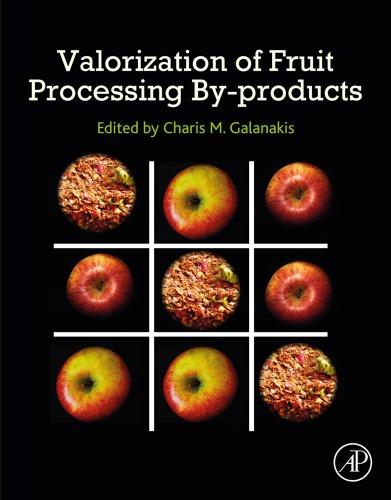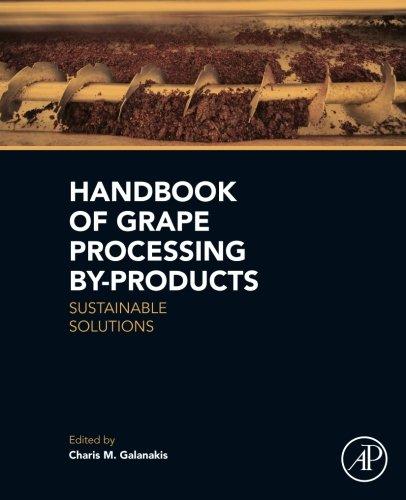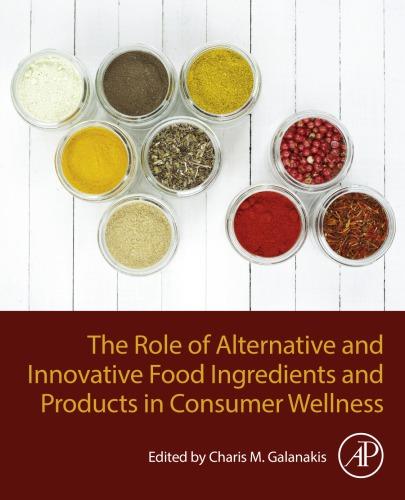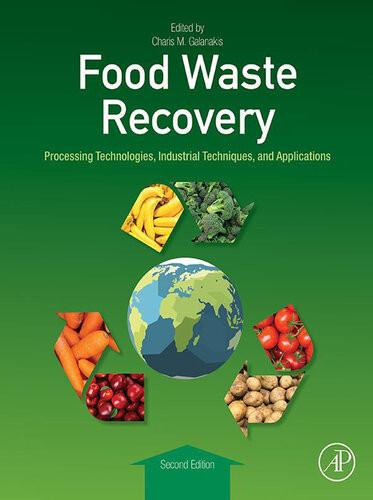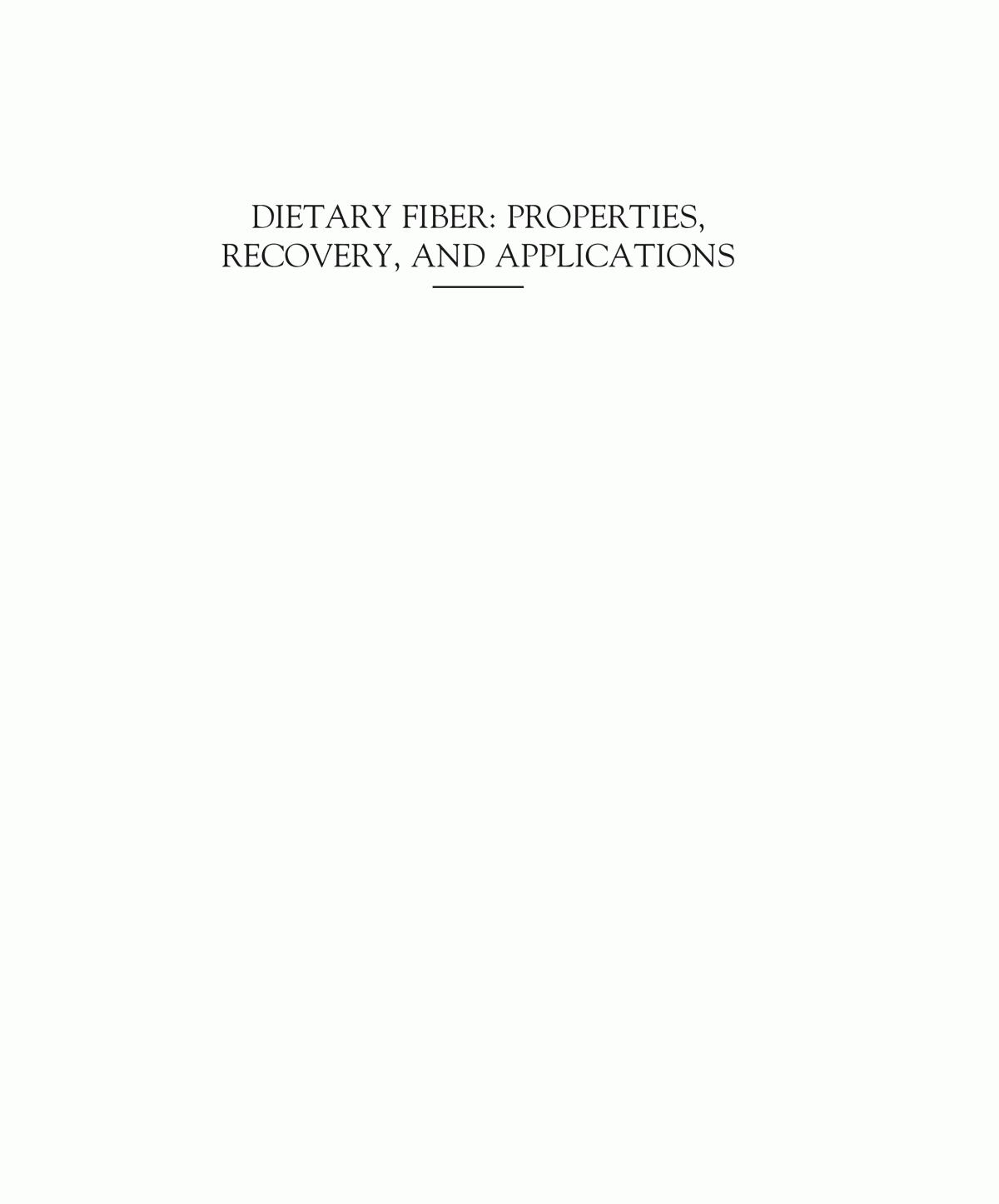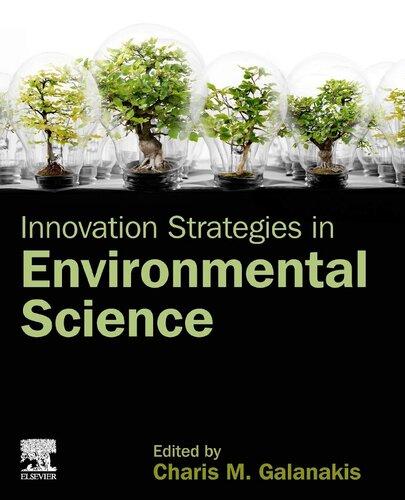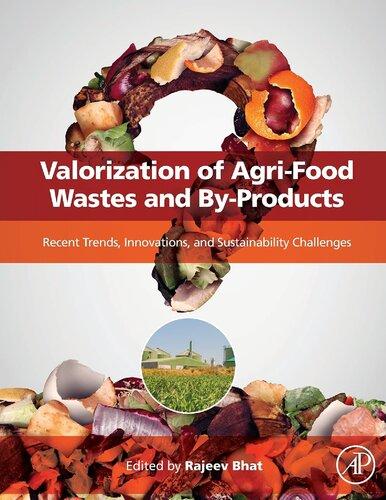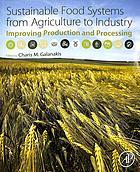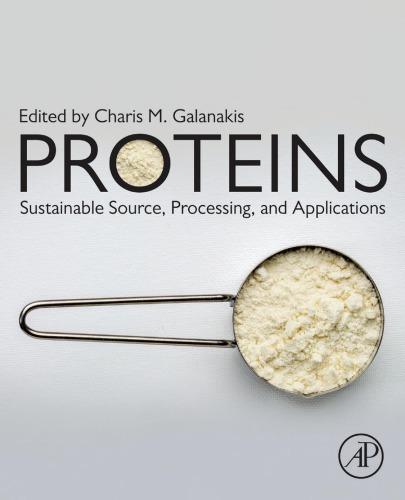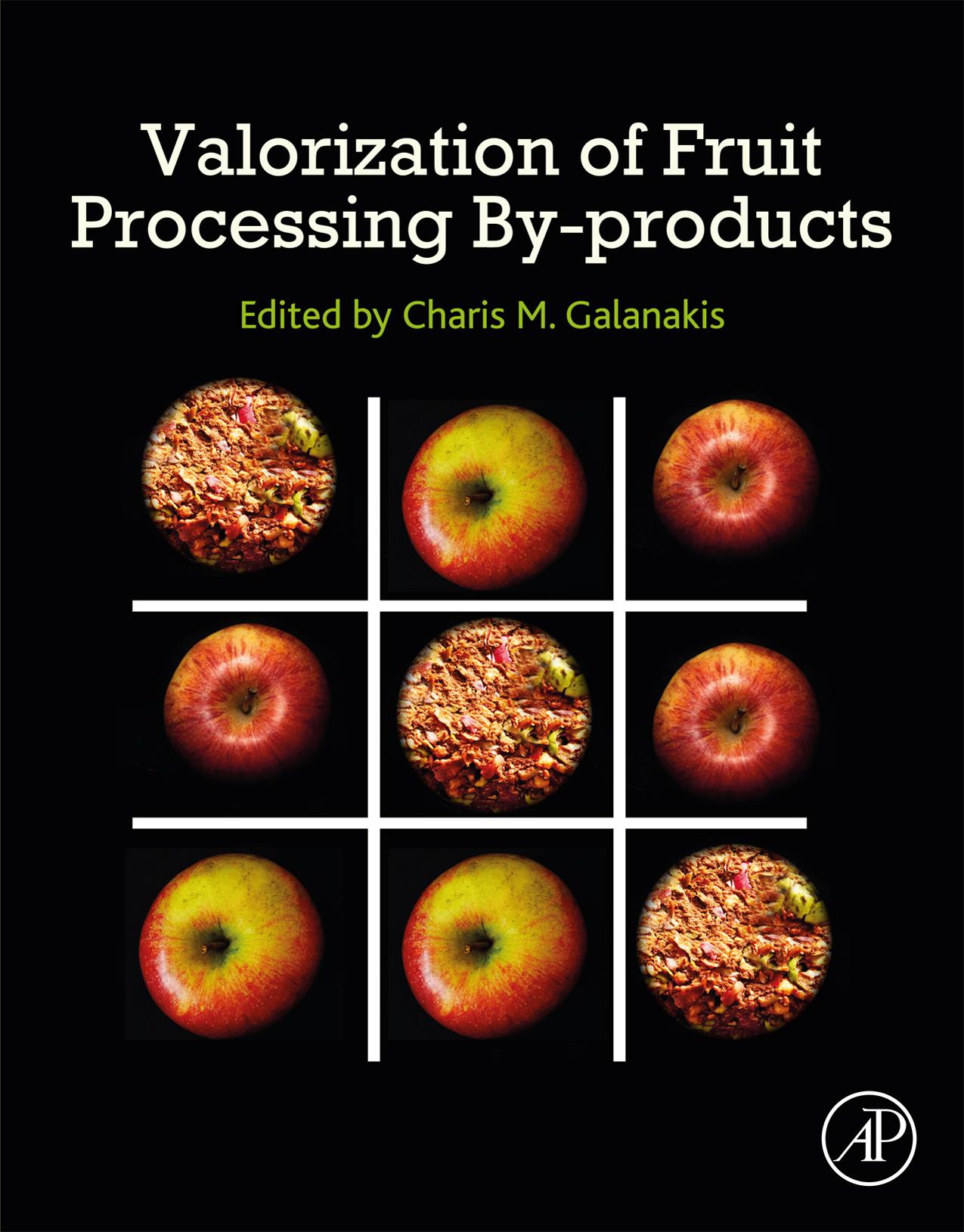ValorizationofFruit ProcessingBy-products
Editedby CharisM.Galanakis
Research&InnovationDepartment,GalanakisLaboratories,Chania,Greece FoodWasteRecoveryGroup,ISEKIFoodAssociation,Vienna,Austria
AcademicPressisanimprintofElsevier 125LondonWall,LondonEC2Y5AS,UnitedKingdom 525BStreet,Suite1650,SanDiego,CA92101,UnitedStates 50HampshireStreet,5thFloor,Cambridge,MA02139,UnitedStates TheBoulevard,LangfordLane,Kidlington,OxfordOX51GB,UnitedKingdom
Copyright©2020ElsevierInc.Allrightsreserved.
Nopartofthispublicationmaybereproducedortransmittedinanyformorbyanymeans,electronicormechanical,including photocopying,recording,oranyinformationstorageandretrievalsystem,withoutpermissioninwritingfromthepublisher. Detailsonhowtoseekpermission,furtherinformationaboutthePublisher’spermissionspoliciesandourarrangements withorganizationssuchastheCopyrightClearanceCenterandtheCopyrightLicensingAgency,canbefoundatourwebsite: www.elsevier.com/permissions .
ThisbookandtheindividualcontributionscontainedinitareprotectedundercopyrightbythePublisher(otherthanasmaybe notedherein).
Notices
Knowledgeandbestpracticeinthisfieldareconstantlychanging.Asnewresearchandexperiencebroadenourunderstanding, changesinresearchmethods,professionalpractices,ormedicaltreatmentmaybecomenecessary.
Practitionersandresearchersmustalwaysrelyontheirownexperienceandknowledgeinevaluatingandusinganyinformation, methods,compounds,orexperimentsdescribedherein.Inusingsuchinformationormethodstheyshouldbemindfuloftheir ownsafetyandthesafetyofothers,includingpartiesforwhomtheyhaveaprofessionalresponsibility.
Tothefullestextentofthelaw,neitherthePublishernortheauthors,contributors,oreditors,assumeanyliabilityforanyinjury and/ordamagetopersonsorpropertyasamatterofproductsliability,negligenceorotherwise,orfromanyuseoroperationof anymethods,products,instructions,orideascontainedinthematerialherein.
BritishLibraryCataloguing-in-PublicationData
AcataloguerecordforthisbookisavailablefromtheBritishLibrary LibraryofCongressCataloging-in-PublicationData
AcatalogrecordforthisbookisavailablefromtheLibraryofCongress
ISBN:978-0-12-817106-6
ForInformationonallAcademicPresspublications visitourwebsiteat https://www.elsevier.com/books-and-journals
Publisher: CharlotteCockle
AcquisitionEditor: NinaRosadeAraujoBandeira
EditorialProjectManager: KaterinaZaliva
ProductionProjectManager: NileshKumarShah
CoverDesigner: MarkRogers
TypesetbyMPSLimited,Chennai,India
1.Fruitprocessingby-productsas foodingredients1
SusanneStruckandHaraldRohm
1.1Introduction1
1.2Processingoffruitby-products2
1.2.1Pomaceprocessingconditions2
1.2.2Influenceofprocessingonpomace composition3
1.3Technofunctionalandphysical propertiesofprocessedfruitpomace4
1.3.1Pomaceasasourceofdietary fiberandbioactivecompounds4
1.3.2Roleofdietaryfiberinthehuman nutrition4
1.3.3Physicalpropertiesofprocessedfruit pomace5
1.4Applicationoffruitpomaceinbaked products6
1.5Pasta9
1.6Meatproducts10
1.7Conclusion12 References12
2.Apple17
SenkaVidovi ´ c,AleksandraTepi ´ cHorecki, JelenaVladi ´ c,Zdravko ˇ Sumi ´ c, AleksandraGavari ´ candAnitaVakula
2.1Apple17
2.2Applefruitprocessing18
2.2.1Applefruitjuiceproduction18
2.2.2Concentratedfruitjuiceproduction25
2.2.3By-productsofapplefruitjuice production26
2.2.4Otherappleprocessing—applecontainingfruitfiltertea productionandby-product remaining27
2.3Possibilitiesofapplicationofapple processingby-products28
2.3.1Pectin29
2.3.2Valorizationofappleby-products throughantioxidantsextraction32
2.4Conclusion37 References37 Furtherreading42
3.Apricot43
Estefanı´aGonza ´ lez-Garcı´a,Marı´aLuisaMarina andMarı´aConcepcio´nGarcı ´ a
3.1Introduction43
3.2Apricotkernel44
3.2.1Kerneloil44
3.2.2Kernel:skinandpresscake52
3.2.3Essentialoil55
3.3Otherapricotby-products56
3.3.1Pomace56
3.3.2Thinnedapricots58
3.3.3Blanchingwaterconcentrateand debitteringwaterconcentrate58
3.4Applicationofapricotby-products58
3.5Conclusionsandfuturetrends61 Acknowledgments61 References61
4.Avocado67
HueyShiLye,MeiKyingOng,LaiKuanTeh, ChewCheenChangandLooKeatWei
4.1Introduction67
4.2Nutritionalcomposition70
4.3Extractionofphytochemicals72
4.4Healthbenefits74
4.4.1Antioxidanteffect74
4.4.2Anticancer78
4.4.3Antidiabetic80
4.4.4Antiatherogenic81
4.4.5Antimicrobialeffect84
4.4.6Antiinflammatoryeffect86
4.5Industrialapplications88
4.6Conclusion89 References89 Furtherreading93
5.Berries95
PetrasRimantasVenskutonis
Abbreviations95
5.1Introduction96
5.2Compositionofberrypomace97
5.2.1Cellwallpolysaccharides, proteins,andminerals97
5.2.2Berrypomaceandseedoil99
5.2.3Phytochemicalcompositionand bioactivitiesofpomace102
5.3Processingofberrypomace108
5.3.1Postpressingpreparationofberry pomaceforprocessing108
5.3.2Extractionofvariousconstituents fromberrypomace109
5.4Applicationofberrypomaceproducts116
5.4.1Applicationsofdried berrypomace117
5.4.2Applicationsofberrypomace extracts118
5.4.3Encapsulationofpomace ingredients119
5.5Conclusion120 Acknowledgments120 References120 Furtherreading125
6.Chestnut127
DianaPinto,NairBraga,AnaMargaridaSilva, PauloCosta,CristinaDelerue-Matos andFranciscaRodrigues
Abbreviations127
6.1Introduction128
6.2 Castaneasativa by-products128
6.2.1Leaves129
6.2.2Flowers133
6.2.3Shells135
6.2.4Burs137
6.3Futureperspectives140
6.4Conclusion140 Acknowledgments141 References141
7.Citrusfruits145
DebajyotiKundu,MohanDas,ReddhyMahle, PrithaBiswas,SandipanKarmakarandRintu Banerjee
7.1Introduction145
7.2Citrusfruitwastegenerationand management146
7.3Valorizationofcitruswaste148
7.3.1Recoveryof phytochemicals/bioactive compounds148
7.3.2Recoveryofessentialoil151
7.3.3Recoveryofenergy152
7.4Othervalue-addedproducts157
7.4.1Productionofenzymes157
7.4.2Organicacidproduction159
7.4.3Dietaryfibersproduction159
7.4.4Productionofsinglecellprotein160
7.4.5Candypreparation160
7.5Bioeconomyconceptincitruswaste valorization161
7.6Futurescope162
7.7Conclusion162 References162 Furtherreading166
8.Mango167
C.H.Okino-Delgado,D.Z.Prado, MileneStefaniPereira,DafneAngelaCamargo, MelianeAkemiKoikeand LucianaFranciscoFleuri
8.1Introduction167
8.2Mangowaste169
8.3Mangopeel170
8.4Mangoseed172
8.5Mangowasteassubstrate174
8.6Prospectsandconclusion177 References177 Furtherreading181
9.Passionfruit183
PramoteKhuwijitjaru andKhwanjaiKlinchongkon
9.1Introduction183
9.2Passionfruitproduction184
9.3Pulpandjuiceprocessing185
9.4Animalfeeding185
9.5Valuablecomponentsfrompeel185
9.5.1Dryingofpeel185
9.5.2Pectinandpecticoligosaccharides186
9.5.3Dietaryfiber189
9.5.4Passionfruitpeelflour190
9.5.5Passionfruitpeelextract190
9.6Valuablecomponentsfromseed191
9.6.1Dryingofseed191
9.6.2Seedoil191
9.6.3PiceatannolandscirpusinB195
9.6.4Otherphenoliccompoundsand antioxidantactivities196
9.6.5Seedprotein196
9.6.6Antifungalprotein196
9.6.7Seedfiber197
9.7Conclusion197 References197
10.Pineapple203
TodorVasiljevic
10.1Introduction203
10.2Pineapplewasteutilization204
10.3Proteinutilizationfrompineapple waste—bromelainenzyme204
10.4Bromelainextractionstrategies209
10.5Membranefiltrationprocessfor bromelainextraction209
10.6Applicationofmembranetechnology inbromelainpurification213
10.7Configurationalconsiderations213
10.8Processingparametersconsiderations216
10.9Bromelainpurity217
10.10Valorizationofcarbohydrates218
10.10.1Insolublefibers—cellulose andhemicellulose218
10.11Solublefibers—pectinandgums218
10.12Simplesugars—productionof organicacids219
10.13Othervalue-addedproducts obtainedfrompineapplewaste219
10.14Conclusion220 References221 Furtherreading225
11.Pinkguava227
YingPingChang,KwanKitWoo andCharlesGnanaraj
11.1Introduction227
11.1.1Aboutpinkguava227
11.1.2Pinkguavaby-products228
11.2Functionalpropertiesand health-promotingeffectsofpinkguava phytochemicalconstituents229
11.3Possibleroutestoupgradepink guavaby-productscommercialization values231
11.3.1Phytochemicalextraction233 11.3.2Prebioticsingredients240 11.3.3Substrateforfermentation241
11.4Processingmethodtominimize thewasteafterextraction242
11.5Constraintsandchallengesin reutilizingpinkguavaby-products245 11.6Furtherresearchtofillthe knowledgegap247 References248
12.Pomegranate253
ShohrehSaffarzadeh-Matin
12.1Introduction253
12.1.1Polyphenolextractionof pomegranatewaste254
12.1.2Assessmentofextraction methodefficiency265
12.1.3Purificationandfractionation268
12.1.4Healthbenefits,safety assessment,andstabilityof pomegranatefruitextract270
12.1.5Concludingremarks272 References273
13.Strawberry281
IsidoroGarcı´a-Garcı´a, M.CarmenGarcı´a-Parrilla, InesM.Santos-Duenas,AlbertMas andAnaM.Canete-Rodrı ´ guez
13.1Introduction281
13.2Developmentofnewproducts285
13.3Usingstrawberriestoobtain fermentedproducts287
13.3.1Processdevelopmentand qualitycontrol287
13.3.2Biotransformationofstrawberry pure ´ eintowineandvinegar288
13.4Conclusions296 Acknowledgments296 References297 Furtherreading300 Index301
Thispageintentionallyleftblank
ListofContributors
RintuBanerjee DepartmentofAgriculturalandFood Engineering,IndianInstituteofTechnology Kharagpur,Kharagpur,India
PrithaBiswas SchoolofMedicalScienceandTechnology, IndianInstituteofTechnologyKharagpur,Kharagpur, India
NairBraga REQUIMTE/LAQV,InstitutoSuperiorde EngenhariadoPorto,InstitutoPolite ´ cnicodoPorto, Porto,Portugal
DafneAngelaCamargo Sa ˜ oPauloState University(UNESP),InstituteofBiosciences, Botucatu,Brazil
AnaM.Canete-Rodrı´guez DepartamentodeQuı´mica Inorga ´ nicaeIngenierı´aQuı´mica,Facultadde Ciencias,UniversidaddeCo ´ rdoba,Co ´ rdoba,Espana
ChewCheenChang DepartmentofChemicalScience, FacultyofScience,UniversitiTunkuAbdulRahman, Kampar,Malaysia
YingPingChang FacultyofScience,Departmentof ChemicalScience,UniversitiTunkuAbdulRahman, NegeriPerak,Malaysia
PauloCosta REQUIMTE/UCIBIO,DepartmentofDrug Sciences,FacultyofPharmacy,UniversityofPorto, Porto,Portugal
MohanDas DepartmentofAgriculturalandFood Engineering,IndianInstituteofTechnology Kharagpur,Kharagpur,India
CristinaDelerue-Matos REQUIMTE/UCIBIO, DepartmentofDrugSciences,FacultyofPharmacy, UniversityofPorto,Porto,Portugal
LucianaFranciscoFleuri SaoPauloStateUniversity (UNESP),InstituteofBiosciences,Botucatu,Brazil
Marı´aConcepcio ´ nGarcı ´ a DepartmentofAnalytical Chemistry,PhysicalChemistryandChemical Engineering,FacultyofScience,ChemicalResearch Institute“Andre ´ sM.delRı´o”(IQAR),Universityof Alcala ´ ,Madrid,Spain
IsidoroGarcı´a-Garcı´a DepartamentodeQuı´mica Inorga ´ nicaeIngenierı´aQuı´mica,Facultadde Ciencias,UniversidaddeCo ´ rdoba,Co ´ rdoba,Espan ˜ a
M.CarmenGarcı´a-Parrilla DepartamentodeNutricio ´ n yBromatologı´a,Toxicologı´ayMedicinaLegal, FacultaddeFarmacia,UniversidaddeSevilla,Sevilla, Spain
AleksandraGavari ´ c FacultyofTechnologyNoviSad, UniversityofNoviSad,NoviSad,Serbia
CharlesGnanaraj FacultyofScience,Departmentof ChemicalScience,UniversitiTunkuAbdulRahman, NegeriPerak,Malaysia
Estefanı´aGonza ´ lez-Garcı´a DepartmentofAnalytical Chemistry,PhysicalChemistryandChemical Engineering,FacultyofScience,ChemicalResearch Institute“Andre ´ sM.delRı´o”(IQAR),Universityof Alcala ´ ,Madrid,Spain
SandipanKarmakar XavierInstituteofManagement, XavierUniversity,Bhubaneswar,India
PramoteKhuwijitjaru DepartmentofFood Technology,FacultyofEngineeringandIndustrial Technology,SilpakornUniversity,NakhonPathom, Thailand
KhwanjaiKlinchongkon DepartmentofInnovation inFoodTechnology,CollegeofHealthSciences, ChristianUniversityofThailand,NakhonPathom, Thailand
MelianeAkemiKoike SaoPauloStateUniversity (UNESP),InstituteofBiosciences,Botucatu,Brazil
DebajyotiKundu DepartmentofAgriculturalandFood Engineering,IndianInstituteofTechnology Kharagpur,Kharagpur,India
HueyShiLye DepartmentofAgriculturalandFood Science,FacultyofScience,UniversitiTunkuAbdul Rahman,Kampar,Malaysia
ReddhyMahle DepartmentofAgriculturalandFood Engineering,IndianInstituteofTechnology Kharagpur,Kharagpur,India
Marı´aLuisaMarina DepartmentofAnalytical Chemistry,PhysicalChemistryandChemical Engineering,FacultyofScience,ChemicalResearch Institute“Andre ´ sM.delRı´o”(IQAR),Universityof Alcala ´ ,Madrid,Spain
AlbertMas DepartamentodeBioquı´micai Biotecnologı´a,FacultaddeEnologı´a,Universitat RoviraiVirgili,Tarragona,Espana
C.H.Okino-Delgado AgronomicEngineering,University CenterofRioPreto,Sa ˜ oJose ´ doRioPreto,Brazil
MeiKyingOng DepartmentofAgriculturalandFood Science,FacultyofScience,UniversitiTunkuAbdul Rahman,Kampar,Malaysia
MileneStefaniPereira SaoPauloStateUniversity (UNESP),InstituteofBiosciences,Botucatu,Brazil
DianaPinto REQUIMTE/LAQV,InstitutoSuperiorde EngenhariadoPorto,InstitutoPolite ´ cnicodoPorto, Porto,Portugal
D.Z.Prado Sa ˜ oPauloStateUniversity(UNESP), InstituteofBiosciences,Botucatu,Brazil
FranciscaRodrigues REQUIMTE/LAQV,Instituto SuperiordeEngenhariadoPorto,InstitutoPolite ´ cnico doPorto,Porto,Portugal
HaraldRohm ChairofFoodEngineering,Insituteof NaturalMaterialsTechnology,TechnischeUniversitat Dresden,Dresden,Germany
ShohrehSaffarzadeh-Matin DepartmentofChemical Technologies,IranianResearchOrganizationfor ScienceandTechnology(IROST),Tehran,Iran
InesM.Santos-Duen ˜ as DepartamentodeQuı´mica Inorga ´ nicaeIngenierı´aQuı´mica,Facultadde Ciencias,UniversidaddeCo ´ rdoba,Co ´ rdoba,Espana
AnaMargaridaSilva REQUIMTE/LAQV,Instituto SuperiordeEngenhariadoPorto,InstitutoPolite ´ cnico doPorto,Porto,Portugal
SusanneStruck ChairofFoodEngineering,Insituteof NaturalMaterialsTechnology,TechnischeUniversitat Dresden,Dresden,Germany
Zdravko ˇ Sumi ´ c FacultyofTechnologyNoviSad, UniversityofNoviSad,NoviSad,Serbia
LaiKuanTeh DepartmentofBiomedicalScience, FacultyofScience,UniversitiTunkuAbdulRahman, Kampar,Malaysia
AleksandraTepi ´ cHorecki FacultyofTechnologyNovi Sad,UniversityofNoviSad,NoviSad,Serbia
AnitaVakula FacultyofTechnologyNoviSad, UniversityofNoviSad,NoviSad,Serbia
TodorVasiljevic InstituteforSustainableIndustriesand LiveableCities,VictoriaUniversity,Melbourne,VIC, Australia
PetrasRimantasVenskutonis DepartmentofFood ScienceandTechnology,KaunasUniversityof Technology,Kaunas,Lithuania
SenkaVidovi ´ c FacultyofTechnologyNoviSad, UniversityofNoviSad,NoviSad,Serbia
JelenaVladi ´ c FacultyofTechnologyNoviSad, UniversityofNoviSad,NoviSad,Serbia
LooKeatWei DepartmentofBiologicalScience,Faculty ofScience,UniversitiTunkuAbdulRahman,Kampar, Malaysia
KwanKitWoo LeeKongChianFacultyofEngineering andScience,DepartmentofChemicalEngineering, UniversitiTunkuAbdulRahman,NegeriPerak, Malaysia
Preface
Theglobalfruitprocessingindustryhasbeengrowingsteadilyoverthelastfewyearsduetopopulationgrowth,consumers’eatingpatternstargetinghealthierproducts,andfinallyadvancesinsupplychainmanagementandproduction processes.Atthesametime,fruitprocessingresultsinsignificantamountsofby-productsthataretypicallygivenas animalfeedordischargedintotheenvironment.Thispracticecannotbecontinuedwithinthebioeconomyframework ofourtimes.Inparticular,theurgentneedforsustainabilitywithinthefruitindustryhasturnedtheinterestsofresearch towardinvestigatingthehandlingoftheseby-productsfromanotherperspective,forexample,byadaptingmore profitableoptions,utilizingcontainedantioxidants,etc.Subsequentlythereisaneedforanewguidecoveringthelatest advancesinthisdirection.
FoodWasteRecoveryGroup(www.foodwasterecovery.group ofISEKIFoodAssociation)hasorganizeddifferent traininganddevelopmentactionsinthefieldoffoodandenvironmentalscienceandtechnology,includingteaching activities(e-course,referencemodule,trainingworkshops,andwebinars),literaturematerials,experts’database,several newschannelsfordisseminationofknowledge,andanopeninnovationnetwork,withtheaimtobridgethegap betweenacademiaandthefoodindustry.Inaddition,thegrouphaspublishedbooksdealingwithfoodwasterecovery technologies,differentfoodprocessingby-products’valorization(e.g.,fromolive,grape,cereals,coffee,meat,etc.), sustainablefoodsystemsandsavingfood,sustainablewaterandwastewaterprocessing,innovationsinthefoodindustry andtraditionalfoods,nutraceuticalsandnaturalproductpharmaceuticals,andnonthermalprocessing,aswellasthetargetingoffunctionalcompoundssuchaspolyphenols,proteins,dietaryfiber,andcarotenoids.
Followingonfromtheseefforts,thecurrentbookaimstoindicatethealternativesolutionsfortheupgradingofprocessingby-productsofdifferentfruits,aswellasdenotingtheirindustrialpotentialasasourcefortherecoveryofbioactivecompoundsandtheirreutilizationindifferentsectors(e.g.,food,beverage,nutraceutical,andcosmetic industries).Theultimategoalistosupportthescientificcommunity,professionals,andenterprisesthataspireto developreal,high-scaleindustrialapplications.Itfocusesonthemostrecentadvancesinthefield,whilealsoanalyzing thepotentialofalreadycommercializedprocessesandproducts.Thebookfillstheexistinggapinthecurrentliterature byprovidingaguideforalltheinvolvedstakeholders,professionals,andtechnologistswhoareactiveinthefieldand aretryingtooptimizetheperformanceoffruitprocessingindustriesandreducetheirenvironmentalimpact.
Thebookconsistsof13chapters. Chapter1,Fruitprocessingby-productsasfoodingredients,introducesthesubject ofthebookbyprovidingashortoverviewontheprocessingandcompositionoffruits’pomace.Byhighlightingthe importanceofpomaceasanutritionallyvaluablematerial,thechapterreviewstheincorporationoffruitpomacein selectedfoods.Emphasisisespeciallygiventobakeryproducts,extrudedcerealproducts,pasta,andmeatproducts. Theremainingchaptersofthebookdealwithdifferentfruitprocessingby-productsinchaptersplacedin alphabeticorder.
Chapter2 dealswithapples.Applejuiceproductiongeneratesapproximately25%ofby-productsincludingpomace, peel,andseeds.Traditionalapplicationsofappleprocessingby-productstypicallyconcerncompostingorcrudefeed. Nevertheless,owingtoitshighcarbohydratecontent,applepomacecanbeusedasasubstratefortheproductionofvariousvalue-addedproductssuchasorganicacids,enzymes,andethanol.Theapplicationofapplepomaceintheproductionofbiscuitsandrelatedproductsduetoitshighpectincontentisalsoreported.
Chapter3discussestheby-products(mainlystone)ofapricotprocessing.Theapricotisastonefruitbelongingto the Prunus genushighlyconsumedworldwide.Theapricotkernelisagreatsourceofoil,mainlycomposedoffatty acids,especiallyunsaturatedfattyacid s.Thisoilalsopresentshighconcentrati onsoftriterpenoids,carotenoids,vitaminEactivecompounds,phytosterols,andpolyphenols.Apricotkernelsarealsoasourceofproteins,peptides,and essentialoil.
Chapter4 dealswiththenutritionalprofiles,theextractionofphytochemicals,andtheindustrialapplicationsofavocadoanditsby-products(seed,pulp,andpeel).Avocadohasbeenrecognizedasanutritionallyvaluabletropicalfruit thathasavarietyofhealth-promotingeffectsandnutrients.Paststudieshaverevealedthatavocadopossesses
antioxidant,anticancer,antidiabetic,antiatherogenic,antihypertensive,antiinflammatory,andantimicrobialeffects. Wholeavocadoanditsderivativeshavebeenusedinvariousindustriesasamainingredientandhavebeenprocessed intoanumberoffoodproductsandskincareproducts,whileavocado’sprocessingby-productshavenotbeenmuch investigatedyet.
Chapter5reviewstheresultsofinvestigationsconcerningpomacefromberries.Berriesareamongtherichest sourcesofhealth-beneficialphytochemicals,andtheircultivationandconsumptionaresteadilyincreasing.Juiceproductionfromberriesgenerateslargeamountsofpresscake(pomace),aby-productofberryprocessing,whichretains largefractionsofvariousberrycomponents,includingvaluablephenoliccompounds,seedoils,dietaryfiber,minerals, andothers.Currently,considerablequantitiesofpomacearediscardedaswaste,causingboththelossofvaluablenutrientsandenvironmentalpollution.Itisevidentthatberrypomaceshouldbeusedmoreefficiently,forexample,forthe recoveryofvaluableconstituentsandthedevelopmentofingredientsforhumannutritionandotherapplications.
Duringchestnutprocessing,alargeamountofwastematerialisgenerated. Chapter6 providesknowledgeonthe typesofchestnutby-productsproduced(e.g.,leaves,flowers,shellsandburs),theirchemicalcompositions,andbiologicalactivities,priortodiscussingtheirpossibleapplicationsinthepharmaceutical,food,orcosmeticssectors.
Wastefromthecitrusprocessingindustry,generatedafterjuiceextraction,comprisesabout50%ofthewetmassof citrusfruits,ofwhichabout50%ispeelwaste.Withtheincreasingsizeofthecitrusindustry,colossalvolumesof wastearebeingreleasedconstantlyintotheenvironment. Chapter7 highlightsthevalorizationofcitruswastethrough value-addedproductrecoveryandenergyproduction,whichisgainingmoreimpetusundertheumbrellaofthebiobased economy.
Chapter8 dealswiththemango,whichisamongthemostconsumedfruitsworldwide.Indeedtheconsumptionof processedmangoproductshasgrown,andconsequentlythegenerationofmangowastehasalsogrown,sincethepulp (themainproduct)correspondstoapproximatelyhalfofthefruitmass.Mangoby-productscanbeusedbythefinal consumerorasfoodingredientsindiversesegmentssuchasfoods,pharmaceuticals,finechemicals,cosmetics,cleaning products,andpersonalhygieneproducts.
Chapter9 discussesthevalorizationofpassionfruitby-products,whichhaveattractedmanufacturersandresearchers worldwideduetothefactthattheycontainvaluableandhealth-beneficialcomponents.Currentby-productvalorizing schemesthathavebeenalreadycommercializedincludetheextractionofseedoilandthefurtherfractionationofunsaponifiablefractionforcosmeticpurposes.Inaddition,seedextractscontainingfunctionalphenoliccompounds,piceatannol,andscirpusinBarealsointhemarket.Atthesametimeanumberofresearchworksonthepeelhaverevealed variouspossibilitiesfortheextractionofpectinandotherbioactivecompounds.
Chapter10 focusesontheextractionofvaluablecompoundsfrompineappleon-farmandfromprocessingwastefor foodandtherapeuticsapplications.Anemphasisisgiventomoreenvironment-friendlyandcommerciallyviabletechnologies—mainlymembrane-basedextractiontechniques.Thehighcarbohydratecontent(55%)andpresenceofa highlyvaluableenzyme,bromelain,inpineapplewastemakesitanappropriatesubstrateforasimpleextractionofthese valuablecompoundsorfeasiblebioconversionsintoxylitol,xylooligosaccharides,lacticacid,succinicacid,andothers, whichallhavepotentialapplicationsinthefoodindustry.
Guavaisapopulartropicalfruiteateneitherfreshorinapreservedorprocessedformanditisalsoagoodsource ofdietaryfiberandnaturalantioxidantcompounds.Thefleshyedibleportionofguavafruitonlyconstitutesabout50% ofthewholefruit,whilethepeel(20%)andseedcore(30%)aretakentoalandfillsiteaswaste. Chapter11 discusses possibleroutestoupgradethecommercialvaluesofpinkguavaby-productsbyapplyingdifferentextractiontechniques torecovervaluablephytochemicals.Themanufacturersofprocessedguavamayincludeby-productsprocessinginone oftheirproductionlinesinordertogeneratediverseproductsoringredientswithina“zero-waste”conceptandto achieveamoresustainableapproach.
Chapter12 providesanupdatedoverviewofthepolyphenolicextractionofpomegranatewaste,includingvarious extractionprocessvariables,conventionalandnonconventionalextractionmethods,andextractionprocessoptimization. Additionally,thepurificationandfractionationofpolyphenolicextracts,includingsmall-scaleisolation,selective adsorption desorption,andmembranefiltrationprocessarecovered,too.Furthermore,thehealthbenefits,safety assessments,andimprovementsinstabilityoftheextractsarereviewed.
Thestrawberry’sinstabilityinseasonalmarkets,highperishability,andstringentqualitycriteriacanleadtosubstantialsurpluseswithhighlyadverseimpactsonsocialandeconomicconditionsintheproductionareas,andalsoonthe environmentbytheeffectofsuchsurplusesconstitutinghighlypollutingwaste.Chapter13discussestheproductionof newbeveragesandcondimentsbymixingtwoessentialingredientsobtainedinparallelbythebiotransformationof strawberrypure ´ e.Pure ´ ecanbeusedtoobtainstrawberryvinegarthroughalcoholicfermentationandsubsequent
Preface xiii
acetification,aswellasgluconicacidbytheselectivebioconversionofglucosewhilepreservingthefructosecontentof thesubstrate.
Inconclusion,thisbookaddressesresearchers,consultants,andnewproductdevelopersworkinginthefoodand fruitprocessingindustry.ItcouldbeutilizedbyUniversitylibraries,Institutes,andAgenciesworldwideasatextbook andancillaryreadinginundergraduateandpostgraduatelevelmultidisciplinecoursesdealingwithagriculture,bioresourcetechnology,andfoodscience.Atthispoint,Iwouldliketothankalltheauthorsforacceptingmyinvitationto contributetothisbook.Theiradaptiontoeditorialguidelinesandproject’stimelinearehighlyappreciated.InfactI considermyselffortunatetohavehadtheopportunitytocollaboratewithdifferentinternationalexpertsfromAustralia, Brazil,India,Iran,Lithuania,Malaysia,German,Portugal,Spain,andThailand.IwouldalsoliketothanktheacquisitioneditorsNinaBandeiraandNancyMaragioglio,thebookmanagerKaterinaZaliva,aswellasElsevier’sproduction teamfortheirassistanceduringeditingandthepublicationprocess.Finally,Ihaveamessageforallofyou,thereaders. Collaborativebookprojectscontainhundredsofthousandsofwordsandthereforetheymaycontainerrorsorgaps.I willwaitforyourinstructivecommentsorevencriticism,sopleasedonothesitatetocontactmeinordertodiscuss anyissuesregardingthevalorizationoffruitprocessingby-products.
CharisM.Galanakis1,2
1Research&InnovationDepartment,GalanakisLaboratories,Chania,Greece, 2FoodWasteRecoveryGroup, ISEKIFoodAssociation,Vienna,Austria
Thispageintentionallyleftblank
Another random document with no related content on Scribd:
touched his cap respectfully. “It’s a pleasant evening, sir; turned quite mild again.” Leidall mumbled some reply or other, and hurried on to hide himself among the shadows of the trees. The policeman stood and watched him, till the darkness swallowed him. “He knows too!” groaned the wretched man. And every bench was occupied; every face turned to watch him; there were even figures behind the trees. He dared not go into the street, for the very taxi-drivers were against him. If he gave an address, he would not be driven to it; the man would know, and take him elsewhere. And something in his heart, sick with anguish, weary with the endless battle, suddenly yielded.
“There are fish in the Serpentine,” he remembered the stranger had said. “And,” he added to himself, with a wave of delicious comfort, “they lead secret, hidden lives that no one can disturb.” His mind cleared surprisingly. In the water he could find peace and rest and healing. Good Lord! How easy it all was! Yet he had never thought of it before. He turned sharply to retrace his steps, but in that very second the clouds descended upon his thought again, his mind darkened, he hesitated. Could he get out again when he had had enough? Would he rise to the surface? A battle began over these questions. He ran quickly, then stood still again to think the matter out. Darkness shrouded him. He heard the wind rush laughing through the trees. The picture of the whirring duck flashed back a moment, and he decided that the best way was by air, and not by water. He would fly into the place of rest, not sink or merely float; and he remembered the view from his bedroom window, high over old smoky London town, with a drop of eighty feet on to the pavements. Yes, that was the best way. He waited a moment, trying to think it all out clearly, but one moment the fish had it, and the next the birds. It was really impossible to decide. Was there no one who could help him, no one in all this enormous town who was sufficiently on his side to advise him on the point? Some clear-headed, experienced, kindly man?
And the face of Dr. Hancock flashed before his vision. He saw the gentle eyes and sympathetic smile, remembered the soothing voice and the offer of companionship he had refused. Of course, there was one serious drawback: Hancock knew. But he was far too tactful, too sweet and good a man to let that influence his judgment, or to betray in any way at all that he did know.
Leidall found it in him to decide. Facing the entire hostile world, he hailed a taxi from the nearest gate upon the street, looked up the address in a chemist’s telephone-book, and reached the door in a condition of delight
and relief. Yes, Dr. Hancock was at home. Leidall sent his name in. A few minutes later the two men were chatting pleasantly together, almost like old friends, so keen was the little man’s intuitive sympathy and tact. Only Hancock, patient listener though he proved himself to be, was uncommonly full of words. Leidall explained the matter very clearly. “Now, what is your decision, Dr. Hancock? Is it to be the way of the fish or the way of the duck?” And, while Hancock began his answer with slow, well-chosen words, a new idea, better than either, leaped with a flash into his listener’s mind. It was an inspiration. For where could he find a better hiding-place from all his troubles than—inside Hancock himself? The man was kindly; he surely would not object. Leidall this time did not hesitate a second. He was tall and broad; Hancock was small; yet he was sure there would be room. He sprang upon him like a wild animal. He felt the warm, thin throat yield and bend between his great hands ... then darkness, peace and rest, a nothingness that surely was the oblivion he had so long prayed for. He had accomplished his desire. He had secreted himself for ever from persecution —inside the kindliest little man he had ever met—inside Hancock....
He opened his eyes and looked about him into a room he did not know. The walls were soft and dimly coloured. It was very silent. Cushions were everywhere. Peaceful it was, and out of the world. Overhead was a skylight, and one window, opposite the door, was heavily barred. Delicious! No one could get in. He was sitting in a deep and comfortable chair. He felt rested and happy. There was a click, and he saw a tiny window in the door drop down, as though worked by a sliding panel. Then the door opened noiselessly, and in came a little man with smiling face and soft brown eyes —Dr. Hancock.
Leidall’s first feeling was amazement. “Then I didn’t get into him properly after all! Or I’ve slipped out again, perhaps! The dear, good fellow!” And he rose to greet him. He put his hand out, and found that the other came with it in some inexplicable fashion. Movement was cramped. “Ah, then I’ve had a stroke,” he thought, as Hancock pressed him, ever so gently, back into the big chair. “Do not get up,” he said soothingly but with authority; “sit where you are and rest. You must take it very easy for a bit; like all clever men who have overworked——”
“I’ll get in the moment he turns,” thought Leidall. “I did it badly before. It must be through the back of his head, of course, where the spine runs up into the brain,” and he waited till Hancock should turn. But Hancock never
turned. He kept his face towards him all the time, while he chatted, moving gradually nearer to the door. On Leidall’s face was the smile of an innocent child, but there lay a hideous cunning behind that smile, and the eyes were terrible.
“Are those bars firm and strong,” asked Leidall, “so that no one can get in?” He pointed craftily, and the doctor, caught for a second unawares, turned his head. That instant Leidall was upon him with a roar, then sank back powerless into the chair, unable to move his arms more than a few inches in any direction. Hancock stepped up quietly and made him comfortable again with cushions.
And something in Leidall’s soul turned round and looked another way. His mind became clear as daylight for a moment. The effort perhaps had caused the sudden change from darkness to great light. A memory rushed over him. “Good God!” he cried. “I am violent. I was going to do you an injury—you who are so sweet and good to me!” He trembled dreadfully, and burst into tears. “For the sake of Heaven,” he implored, looking up, ashamed and keenly penitent, “put me under restraint. Fasten my hands before I try it again.” He held both hands out willingly, beseechingly, then looked down, following the direction of the other’s kind brown eyes. His wrists, he saw, already wore steel handcuffs, and a strait waistcoat was across his chest and arms and shoulders.
THE HOUSE OF THE PAST
O�� night a Dream came to me and brought with her an old and rusty key. She led me across fields and sweet-smelling lanes, where the hedges were already whispering to one another in the dark of the spring, till we came to a huge, gaunt house with staring windows and lofty roof half hidden in the shadows of very early morning. I noticed that the blinds were of heavy black, and that the house seemed wrapped in absolute stillness.
“This,” she whispered in my ear, “is the House of the Past. Come with me and we will go through some of its rooms and passages; but quickly, for I have not the key for long, and the night is very nearly over. Yet, perchance, you shall remember!”
The key made a dreadful noise as she turned it in the lock, and when the great door swung open into an empty hall and we went in, I heard sounds of whispering and weeping, and the rustling of clothes, as of people moving in their sleep and about to wake. Then, instantly, a spirit of intense sadness came over me, drenching me to the soul; my eyes began to burn and smart, and in my heart I became aware of a strange sensation as of the uncoiling of something that had been asleep for ages. My whole being, unable to resist, at once surrendered itself to the spirit of deepest melancholy, and the pain in my heart, as the Things moved and woke, became in a moment of time too strong for words....
As we advanced, the faint voices and sobbings fled away before us into the interior of the House, and I became conscious that the air was full of hands held aloft, of swaying garments, of drooping tresses, and of eyes so sad and wistful that the tears, which were already brimming in my own, held back for wonder at the sight of such intolerable yearning.
“Do not allow all this sadness to overwhelm you,” whispered the Dream at my side, “It is not often They wake. They sleep for years and years and years. The chambers are all full, and unless visitors such as we come to disturb them, they will never wake of their own accord. But, when one stirs, the sleep of the others is troubled, and they too awake, till the motion is communicated from one room to another and thus finally throughout the
whole House.... Then, sometimes, the sadness is too great to be borne, and the mind weakens. For this reason Memory gives to them the sweetest and deepest sleep she has, and she keeps this old key rusty from little use. But, listen now,” she added, holding up her hand; “do you not hear all through the House that trembling of the air like the distant murmur of falling water? And do you not now ... perhaps ... remember?”
Even before she spoke, I had already caught faintly the beginning of a new sound; and, now, deep in the cellars beneath our feet, and from the upper regions of the great House as well, I heard the whispering, and the rustling and the inward stirring of the sleeping Shadows. It rose like a chord swept softly from huge unseen strings stretched somewhere among the foundations of the House, and its tremblings ran gently through all its walls and ceilings. And I knew that I heard the slow awakening of the Ghosts of the Past.
Ah me, with what terrible inrushing of sadness I stood with brimming eyes and listened to the faint dead voices of the long ago.... For, indeed, the whole House was awakening; and there presently rose to my nostrils the subtle, penetrating perfume of Age; of letters, long preserved, with ink faded and ribbons pale; of scented tresses, golden and brown, laid away, ah how tenderly! among pressed flowers that still held the inmost delicacy of their forgotten fragrance; the scented presence of lost memories—the intoxicating incense of the past. My eyes o’erflowed, my heart tightened and expanded, as I yielded myself up without reserve to these old, old influences of sound and smell. These Ghosts of the Past—forgotten in the tumult of more recent memories—thronged round me, took my hands in theirs, and, ever whispering of what I had so long forgot, ever sighing, shaking from their hair and garments the ineffable odours of the dead ages, led me through the vast House, from room to room, from floor to floor.
And the Ghosts—were not all equally clear to me. Some had indeed but the faintest life, and stirred me so little that they left only an indistinct, blurred impression in the air; while others gazed half reproachfully at me out of faded, colourless eyes, as if longing to recall themselves to my recollection; and then, seeing they were not recognised, floated back gently into the shadows of their room, to sleep again undisturbed till the Final Day, when I should not fail to know them.
“Many of them have slept so long,” said the Dream beside me, “that they wake only with the greatest difficulty. Once awake, however, they know and remember you even though you fail to remember them. For it is the rule in this House of the Past that, unless you recall them distinctly, remembering precisely when you knew them and with what particular causes in your past evolution they were associated, they cannot stay awake. Unless you remember them when your eyes meet, unless their look of recognition is returned by you, they are obliged to go back to their sleep, silent and sorrowful, their hands unpressed, their voices unheard, to sleep and dream, deathless and patient, till....”
At this moment, her words died away suddenly into the distance, and I became conscious of an overpowering sensation of delight and happiness. Something had touched me on the lips, and a strong, sweet fire flashed down into my heart and sent the blood rushing tumultuously through my veins. My pulses beat wildly, my skin glowed, my eyes grew tender, and the terrible sadness of the place was instantly dispelled as if by magic. Turning with a cry of joy, that was at once swallowed up in the chorus of weeping and sighing round me, I looked ... and instinctively stretched forth my arms in a rapture of happiness towards ... towards a vision of a Face ... hair, lips, eyes; a cloth of gold lay about the fair neck, and the old, old perfume of the East—ye stars, how long ago—was in her breath. Her lips were again on mine; her hair over my eyes; her arms about my neck, and the love of her ancient soul pouring into mine out of eyes still starry and undimmed. Oh, the fierce tumult, the untold wonder, if I could only remember!... That subtle, mist-dispelling odour of many ages ago, once so familiar ... before the Hills of Atlantis were above the blue sea, or the sands had begun to form the bed of the Sphinx. Yet wait; it comes back; I begin to remember. Curtain upon curtain rises in my soul, and I can almost see beyond. But that hideous stretch of the years, awful and sinister, thousands upon thousands.... My heart shakes, and I am afraid. Another curtain rises and a new vista, farther than the others, comes into view, interminable, running to a point among thick mists. Lo, they too are moving, rising, lightening. At last, I shall see ... already I begin to recall ... the dusky skin ... the Eastern grace, the wondrous eyes that held the knowledge of Buddha and the wisdom of Christ before these had even dreamed of attainment. As a dream within a dream, it steals over me again, taking compelling possession of my whole being ... the slender form ... the stars in that magical Eastern sky ... the
whispering winds among the palm trees ... the murmur of the river’s waves and the music of the reeds where they bend and sigh in the shallows on the golden sand. Thousands of years ago in some æonian distance. It fades a little and begins to pass; then seems again to rise. Ah me, that smile of the shining teeth ... those lace-veined lids. Oh, who will help me to recall, for it is too far away, too dim, and I cannot wholly remember; though my lips are still tingling, and my arms still outstretched, it again begins to fade. Already there is the look of sadness too deep for words, as she realises that she is unrecognised ... she, whose mere presence could once extinguish for me the entire universe ... and she goes back slowly, mournfully, silently to her dim, tremendous sleep, to dream and dream of the day when I must remember her and she must come where she belongs....
She peers at me from the end of the room where the Shadows already cover her and win her back with outstretched arms to her age-long sleep in the House of the Past.
Trembling all over, with the strange odour still in my nostrils and the fire in my heart, I turned away and followed my Dream up a broad staircase into another part of the House.
As we entered the upper corridors I heard the wind pass singing over the roof. Its music took possession of me until I felt as though my whole body were a single heart, aching, straining, throbbing as if it would break; and all because I heard the wind singing round this House of the Past.
“But, remember,” whispered the Dream, answering my unspoken wonder, “that you are listening to the song it has sung for untold ages into untold myriad ears. It carries back so appallingly far; and in that simple dirge, profound in its terrible monotony, are the associations and recollections of the joys, griefs, and struggles of all your previous existence. The wind, like the sea, speaks to the inmost memory,” she added, “and that is why its voice is one of such deep spiritual sadness. It is the song of things for ever incomplete, unfinished, unsatisfying.”
As we passed through the vaulted rooms, I noticed that no one stirred. There was no actual sound, only a general impression of deep, collective breathing, like the heave of a muffled ocean. But the rooms, I knew at once, were full to the walls, crowded, rows upon rows.... And, from the floors below, rose ever the murmur of the weeping Shadows as they returned to their sleep, and settled down again in the silence, the darkness, and the dust.
The dust.... Ah, the dust that floated in this House of the Past, so thick, so penetrating; so fine, it filled the throat and eyes without pain; so fragrant, it soothed the senses and stilled the aching of the heart; so soft, it parched the tongue, without offence; yet so silently falling, gathering, settling over everything, that the air held it like a fine mist and the sleeping Shadows wore it for their shrouds.
“And these are the oldest,” said my Dream, “the longest asleep,” pointing to the crowded rows of silent sleepers. “None here have wakened for ages too many to count; and even if they woke you would not know them. They are, like the others, all your own, but they are the memories of your earliest stages along the great Path of Evolution. Some day, though, they will awake, and you must know them, and answer their questions, for they cannot die till they have exhausted themselves again through you who gave them birth.”
“Ah me,” I thought, only half listening to or understanding these last words, “what mothers, fathers, brothers may then be asleep in this room; what faithful lovers, what true friends, what ancient enemies! And to think that some day they will step forth and confront me, and I shall meet their eyes again, claim them, know them, forgive, and be forgiven ... the memories of all my Past....”
I turned to speak to the Dream at my side, but she was already fading into dimness, and, as I looked again, the whole House melted away into the flush of the eastern sky, and I heard the birds singing and saw the clouds overhead veiling the stars in the light of coming day.
JIMBO’S LONGEST DAY
T�� Longest Day has in it for children a strange, incommunicable thrill. It begins so early in the morning, for one thing, that half of it—the first half— belongs to the mystery of night. It steals upon the world as though from Fairyland, a thing apart from the rush and scurry of ordinary days; it is so long that nothing happens quickly in it; there is a delicious leisure throughout its shining hours that makes it possible to carry out a hundred schemes unhurried. No voice can call “Time’s up!”; no one can urge “Be quick!”; it passes, true, yet passes like a dream that flows in a circle, having neither proper beginning nor definite end. Christmas Day and Easter Day seem short and sharp by comparison. They are measurable. The Longest Day brims with a happy, endless wonder from dawn to sunset. Exceptional happenings are its prerogative.
All this, and something more no elder can quite grasp, lay stealthily in Jimbo’s question: “Uncle, to-morrow’s the Longest Day. What shall we do?” He glanced across the room at his mother, prepared for a prohibitive remark of some sort. But mother, deep in a stolen book, paid no attention. He looked back at me. “It’s all right; she’s not listening; but we can go outside to discuss it, if you prefer,” his expression said. I beckoned him over to me, however, for safety’s sake. My position was fairly strong, I knew, because the stolen book was mine, and had been taken from my work-table. Jimbo’s mother has this way with books, her passion almost unmoral. If a book comes to me for review, if a friend makes me a present of a book, if I buy or borrow one—the instant it comes into the house she knows it. “I just looked in to see if your room had been dusted,” she says; “I’m sorry to disturb you,” and is gone again. But she has seen the new book. Her instinct is curious. I used to think she bribed the postman. She smells a new arrival, and goes straight for it. “Were you looking for this?” she will ask innocently an hour later when I catch her with it, household account-books neglected by her side. “I’m so sorry. I was just peeping into it.” And she is incorrigible, as unashamed. No book is ever lost, at any rate. “Mother’s got it,” indicates its hiding-place infallibly.
So I felt safe enough discussing plans for the Longest Day with Jimbo, and talked openly with him, while I watched her turn the pages.
“It’s the very beginning I like,” he said. “I want to see it start. The sun rises at 3.44, you see. That’s a quarter to four—three hours and a quarter before I usually get up. How shall we manage it, d’you think?” He had worked it all out.
“There’s hardly any night either,” I said, “for the sun sets at 8.18, and that leaves very little time for darkness. It’s light at two, remember.”
He stared into my face. “Maria has an alarum clock. She wakes with that. It’s by her bed in the attic room, you know.”
Mother turned a page noisily, but did not look up. There was no cause for alarm, though we instinctively lowered our voices at once. I cannot say how it was so swiftly, so deftly arranged between us that I was to steal the clock, set it accurately for two in the morning, rise, dress, and come to fetch Jimbo. But the result was clear beyond equivocation, and I had accepted the duty as a man should. Generously he left this exciting thing to me. “And suppose it doesn’t go off and wake you,” he inquired anxiously, “will you be sure to get up and make it go off? Because we might miss the beginning of the day unless you do.” I explained something about the mechanism of the mind and the mechanism of an alarum clock that seemed to satisfy him, and then he asked another vital question: “What is exactly the Longest Day, uncle? I thought all days were about the same—like that,” and he stretched an imaginary line in the air with one hand, so that Mac, the terrier, thought he wanted to play a moment. I explained that too, to his satisfaction, whereupon he nestled much closer to me, glancing first over his shoulder at his mother, and inquired whether “everything knew it was the Longest Day —birds, cows, and out-of-door things all over the world—rabbits, I mean— like that? They know, I suppose?”
“They certainly must find it longer than other days, ordinary days, just common days,” I said. “I’m sure of that.” And then I cleared my throat so loudly that mother looked up from her book with an unmistakable start. “Oh, I’m so sorry,” she exclaimed, with unblushing mendacity, “but d’you want your book? Were you looking for it? I just took a peep——” And when I turned to leave the room with it beneath my arm Jimbo had vanished, leaving no trace behind him.
That night he went to bed without a murmur at half-past eight. He trusted me implicitly. There were no questions: “Have you got the clock?” or “How did you get it?” or anything of the kind—just his absolute confidence that I had got it and that I would wake him. At the stairs, however, he turned and made a sign. Leading me through the back door of the Sussex cottage, we found ourselves a moment in the orchard together. And then, saying no word, he pointed. He pointed everywhere; he stared about him, listening; he looked up into my face, and then at the orchard, and then back into my face again. His whole little person stood on tiptoe, observing, watching, listening. And at first I was disappointed, for I noticed nothing unusual anywhere. “Well, what is it?” my manner probably expressed. But neither of us said a word. The saffron sky shone between the trunks of the apple trees; swallows darted to and fro; a blackbird whistled out of sight; and over the hedge a big cow thrust her head towards us, her body concealed. In the foreground were beehives. The air was very still and scented. My pipe smoke hung almost motionless. I moved from one foot to the other.
“Aha!” I said mysteriously below my breath, “aha!”
And that was sufficient for him. He knew I had seen and understood. He came a step nearer to me, his face solemn and expectant.
“It’s begun already, you see. Isn’t it wonderful? Everything knows.”
“And is getting ready,” I added, “for its coming.”
“The Longest Day,” he whispered, looking about him with suppressed excitement and ready, if necessary, to believe the earth would presently stop turning. He gave one curious look at the sky, shuddered an instant with intense delight, gave my hand a secret squeeze, and disappeared like a goblin into the cottage. But behind him lingered something his little presence had evoked. Wonder and expectation are true words of power, and anticipation constructs the mould along which Imagination later shall lead her fairy band. I realised what he had seen. The orchard, the cow, the beehives did look different. They were inviting, as though something was on the way. The very sky, as the summer dusk spread down it, wore colouring no ordinary June evening knew. Midsummer Eve set free the fairies, and Jimbo knew it. The roses seemed to flutter everywhere on wings.... The very lilac blooms had eyes.... I heard a rustle as of skirts high up among the peeping stars....
How it came about is more than I can say, for I went to bed with a whirr of wings and flowers in my head. The stillness of the night was magical, four short hours of transparent darkness that seemed to gleam and glimmer without hiding anything. Maria’s alarum clock was not beside my bed, for the simple reason that I had not asked for it. Jimbo and the Longest Day between them had cast a glamour over me that had nothing to do with hours, minutes, seconds. It was delicious and inexplicable. Yet at other times I am an ordinary person, who knows that time is money and money is difficult to come by without uncommon effort. All this came for nothing. Jimbo did it.
And what did I do for Jimbo? I cannot say. His is the grand old magical secret. He believed and wondered; he waited and asked no futile questions; time and space obeyed his imperious little will; waking or sleeping he dreamed, creating the world anew. I shut no eye that night. I watched the wheeling constellations rise and pass. The whole, clear summer night was rich with the silence of the gods. I dreamed, perhaps, beside my open window, where the roses and the clematis climbed, shining like lamps of starry beauty above the tiny lawn.... And at half-past one, when the east began to whisper stealthily that Someone was on the way, I left my chair and stole quietly down the narrow passage-way to Jimbo’s room.... I was clever in my wickedness. I knew that if I waked him, whispering that the Longest Day was about to break, he would open half an eye, turn over in his thick childhood sleep, and murmur, as in dream, “Then let it come.” And so, a little weary, if the truth be told, I did all this, and—to my intense surprise —discovered Jimbo perched, wide awake and staring, at the casement window. He had never closed an eye, nor half an eye. He was watchful and alert, but undeniably tired out, as I was.
“Jimbo,” I whispered, stealing in upon him, “the Longest Day is very near. It’s so close you can hear it coming down the sky. It’s softer than any dream you ever dreamed in your life. Come out—if you will—we’ll see it from the orchard.”
He turned towards me in his little nightshirt like a goblin. His eyes were very big, but the eyelids held open with an effort.
“Uncle,” he said in a tiny voice, “do you think it’s really come at last? It’s been terribly slow, but I suppose that’s because it’s such an awful length. Wasn’t it wonderful?”
And I tucked him up. Before the sheet was round his shoulder he was asleep, ... and next morning when we met at breakfast, he just asked me slyly, “Do you think mother guessed or saw anything of what we saw?” We glanced across the table, full of secret signs, together. Mother’s letters were piled beside her plate, a book beneath them. It was my stolen book. She had clearly sat up half the night devouring it.
“No,” I whispered, “I don’t think mother guesses anything at all. Besides,” I added, “to-day is the Longest Day, so in any case she’d be a very long time finding out.” And, as he seemed satisfied, I felt my conscience clear, and said no more about it.
IF THE CAP FITS——
F����-M�����, the naturalist, sat in his corner arm-chair at the Club and watched them—this group of men that had drifted together round the table just opposite and begun to talk. He did not wish to listen, but was too near to help himself. The newspaper over which he had dozed lay at his feet, and he bent forward to pick it up and make it crackle with a pretence of reading.
“Then what is psychometry?” was the question that first caught his attention. It was Slopkins who asked it, the man with the runaway chin and over-weighted, hooked nose, that seemed to bring forward all the top of his face and made him resemble a large codfish for ever in the act of rising to some invisible bait.
“Something to do with soul measuring, I suppose, unless my Greek has gone utterly to pot,” said the jovial man beside him, pouring out his tea from a height, as a waiter pours out flat beer when he wants to force it to froth in the glass.
“Like those Yankee doctors, don’t you remember,” put in someone else, with the irrelevance of casual conversation, “who weighed a human body just before it died and just after, and made an affidavit that the difference in ounces represented the weight of the soul.”
Several laughed. Field-Martin wheeled up his chair with vigorous strokes of his heels and joined the group, accepting the offer of an extra cup out of that soaring teapot. The particular subject under discussion bored him, but he liked to sit and watch men talking, just as he liked to sit and watch birds or animals in the open air, studying their movements, learning their little habits, and the rest. The conversation flowed on in desultory fashion in the way conversations usually do flow on, one or two talkers putting in occasional real thoughts, the majority merely repeating what they have heard others say.
“Yes, but what is psychometry really?” repeated the codfish man, after an interval during which the talk had drifted into an American story that grew apparently out of the reference to American doctors. For that
particular invisible bait still hovered above the surface of his slow mental stream, and he was making a second shot at it, after the manner of his ilk.
The question was so obviously intended to be answered seriously that this time no one guffawed or exercised his wit. For a moment, indeed, no one answered at all. Then a man at the back of the group, a man with a deep voice and a rather theatrical and enthusiastic manner, spoke.
“Psychometry, I take it,” he said with conviction, “is the quality possessed by everything, even by inanimate objects, of sending out vibrations which—which can put certain sensitive persons en rapport, pictorially as it were, with all the events that have ever happened within the ken of such objects——”
“Persons known as psychometrists, I suppose?” from the codfish man, who seemed to like things labelled carefully.
The other nodded. “Psychometrist, I believe,” he continued, “is the name of that very psychical and imaginative type that can ‘sense’ such infinitely delicate vibrations. In reality, I suppose, they are receptive folk who correspond to the sensitive photographic plate that records vibrations of light in a similar way and results in a visible picture.”
A man dropped his teaspoon with a clatter; another splashed noisily in his cup, stirring it; a third plunged at the buttered toast of his neighbour; and Field-Martin, the naturalist, gave an impatient kick with his leg against the arm-chair opposite. He loathed this kind of talk. The speaker evidently was one of those who knew by heart the “patter” of psychical research, or what passes for it among credulous and untrained minds—master of that peculiar jargon, quasi-scientific, about vibrations and the rest, that such persons affect. But he was too lazy to interrupt or disagree. Wondering vaguely who the speaker might be, he drank his tea, and listened with laughter and disgust about equally mingled in his mind. Others, besides the codfish, were asking questions. Answers were not behindhand.
“You remember Denton’s experiments—Professor Denton, of Cambridge, Mass.,” the enthusiastic man was saying, “who found that his wife was a psychometrist, and how she had only to hold a thing in her hand, with eyes blindfolded, to get pictures of scenes that had passed before it. A bit of stone he gave her brought vivid and gorgeous pictures of processions and pageants before her inner eye, I remember, and at the end of the experiment her husband told her what the stone was.”
“By Jove! And what was it?” asked codfish.
“A fragment from an old temple at Thebes,” was the reply.
“Telepathy,” suggested someone.
“Quite possible,” was the reply. “But, another time, when he gave her something wrapped up in a bit of paper, taken from a tray covered with objects similarly wrapped up so that he could not know what particular one he held at the moment, she took it for a second, then screamed out that she was rushing, tearing, falling through space, and let it drop with a gasp of breathless excitement——”
“And——?” asked one or two.
“It was a piece of meteorite,” was the answer. “You see, she had psychometrised the sensations of the falling star. I know, for instance, another woman who is so sensitive to the atmospheres of things and people, that she can tell you every blessed thing about a stranger whose just-vacated chair she sits down in. I’ve known her leave a bus, too, when certain people have got in and sat next to her, because——”
Field-Martin paid for his neighbour’s tea by mistake and moved away, hoping his contempt was not too clearly marked for politeness.
“——everything, you see, has an atmosphere charged with its own individual associations. An object can communicate an emotion it has borrowed by contact with someone living——” was a fragment of the last sentence he heard as he left the room and went downstairs, spitting fire internally against the speaker and all his kidney. He seized his hat and hurried away. He walked home to his Chelsea flat, fuming inwardly, wondering vaguely if there was any other club he could join where he could have his tea without being obliged to listen to such stuff.... He walked through the Park, meaning to cut through via Queensgate, and as he went he followed his usual custom of thinking out details of his work: the next day, for instance, he was to lecture upon “English Birds of Prey,” and in his mind he reviewed carefully the form and substance of what he would say. He skirted the Serpentine, watching the sea-gulls wheeling through the graceful figures of their evening dance against the saffron sky. The exquisite tilt and balance of their bodies fascinated him as usual. He stopped a moment to watch it. To a mind like his it was full of suggestion, and instinctively he began comparing the method of flight with that of the hawks; one or two points occurred to him that he could make good use of in
his lecture ... when he became aware that something drew his attention down from the sky to the water, and that the interest he felt in the birds was being usurped by thoughts of another kind. Without apparent reason, reflections of a very different order passed into the stream of his consciousness—somewhat urgently. Sea-gulls, hawks, birds of prey, and the rest faded from his mental vision; wings and details of flight departed; his eye, and with it his thought, dropped from the sky to the surface of the water, shimmering there beneath the last tints of the sunset. The emotion of the “naturalist,” stirred into activity by the least symbol of his lifelong study —a bird, an animal, an insect—had been curiously replaced; and the transition was abrupt enough to touch him with a sense of surprise—almost, perhaps, of shock.
Now, vigorous imagination, the kind that creates out of next to nothing, was not an ingredient of his logical and “scientific” cast of mind, and FieldMartin, slightly puzzled, was at a loss to explain this irregular behaviour of his usually methodical system. He stepped back farther from the brink where the little waves splashed ... yet, even as he did so, he realised that the force dictating the impulse was of a protective character, guiding, directing, almost warning. In words, had he been a writer, he might have transposed it thus: “Be careful of that water!” For the truth was it had suddenly made him shrink.
He continued his way, puzzled and disturbed. Of the mutinous forces that lie so thinly screened behind life, dropping from time to time their faint, wireless messages upon the soul, Field-Martin hardly discerned the existence. And this passing menace of the water was disquieting—all the more so because his temperament furnished him with no possible instrument of measurement. A sense of deep water, cold, airless, still, invaded his mind; he thought of its suffocating mass lying over mouth and ears; he realised something of the struggle for breath, and the frantic efforts to reach the surface and keep afloat that a drowning man——
“But what nonsense is this? Where do these thoughts suddenly come from?” he exclaimed, hurrying along. He had crossed the road now, so as to put a greater distance, and a stretch of wholesome human traffic, between him and that sheet of water lying like painted glass beneath the fading sky. Yet it pulled and drew him back again to the shore, inviting him with a curious, soft insistence that rendered necessary a distinct effort of will to resist it successfully. Birds were utterly forgotten. His very being was
steeped in water—to the neck, to the eyes, his lungs filled, his ears charged with the rushing noises of singing and drumming that come to complete the dread bewilderment of the drowning man. Field-Martin shook and trembled as he crossed the bridge by Kensington Gardens.... That impulse to throw himself over the parapet was the most outrageous and unaccountable thing that had ever come upon him ... and as he hurried down Queensgate he tried to calculate whether there was time for him to see his doctor that very night before dinner, or whether he must postpone it to the first thing in the morning. For, assuredly, this passing disorder of his brain must have immediate attention; such results of overwork could not be seen to quickly enough. If necessary, he would take a holiday at once....
He decided to say nothing to his wife ... and yet the odd thing was that before dinner was half over the whole mood had vanished so completely, and his normal wholesome balance of mind recovered such perfect control, that he could afford to laugh at the whole thing, and did laugh at it—what was more, even made his wife laugh at it too. The fact remained to puzzle and perplex, but the reality of it was gone.
But that night, when he went to the Club, the hall-porter stopped him:
“Beg pardon, sir, but Mr. Finsen thought you might have taken his hat by mistake last night?”
“His hat?” The name “Finsen” was unknown to him.
“He wears a green felt hat like yours, sir, and they were on adjoining pegs.”
Field-Martin took off his head-covering and discovered his mistake. Finsen’s name was inside in small gold letters. He explained matters with the porter, and left the necessary directions for the exchange to be effected. Upstairs he ran into Slopkins.
“That chap Finsen was asking for you,” he remarked; “it seems you exchanged hats last night by mistake, and the porter thought possibly——”
“Who is Finsen?”
“You remember, he was talking so wonderfully last night about psychometry——”
“Oh, is that Finsen?”
“Yes,” replied the other. “Interesting man, but a bit queer, you know. Gets melancholia and that sort of thing, I believe. It was only a week or two
ago, don’t you remember, that he tried to drown himself?”
“Indeed,” said Field-Martin dryly, and went upstairs to look at the evening papers.
NEWS v. NOURISHMENT
T�� first thing I saw of him was the dome of his bald head and the strip of wandering black hair that strayed across it like a bit of seaweed left by an ebbing tide. The rest was hidden behind the opened newspaper which he devoured while waiting for his luncheon. He was a little man. I saw the tips of square boots with knobs on them projecting beneath the table, and later I noted that his nose was aquiline, and that he had large comfortable ears. He may have been something in a Forwarding Office; he was not spruce enough for banking or insurance circles. He read that evening edition as if the future of the race depended on it.
Then the girl, a lackadaisical, bird-like creature, brought his plate of “braised beef an’ carruts” swimming in thick brown gravy, and set it down with noisy clatter upon the marble table. He was so absorbed that the dishes came as a surprise; and as he looked up, startled, the paper descended softly upon the thick brown gravy. This was the first disaster; for when he lifted it to find his place the columns of print resembled a successful fly-paper. He looked round at everybody, bewildered. For the moment, however, I was so interested in the wandering strip of seaweed on his skull that I hardly noticed his efforts to free the newspaper, himself, his neighbours, and the cruet-stand from the adhesive entanglement of this portion of his luncheon. There was a sound of scattering—then the girl had somehow managed it for him with her grimy napkin. But that remnant of a tide forgotten, as I came to regard it, fascinated me. It strayed, lonely as a cloud; it was so admirably fastened down; the angle, curve, and general adjustment had been evidently chosen with so much care. Its “lie” upon that dome of silence had been calculated to a nicety, so that it should relieve with the best possible effect the open waste around it. It was like a mathematical problem. Only when his grave, dark eyes met mine did I realise that I was staring rudely.
But long before my own hurried luncheon came, the difficulties in which this stranger opposite was involved had fascinated me afresh. The contents of the now mutilated evening paper absorbed him to the point of positive conflict. It may have been the racing news, police reports, or a breach of
promise case; it may have been some special article and leader, or it may have been merely advertisements, perhaps; I cannot say. But his efforts to read and eat at the same time made me wonder with a growing excitement for the final issue of the battle. Had I not been alone, I would have laid a bet —with odds, I think, against “braised beef an’ carruts.”
He did it all so gravely and so earnestly, aware of the claims of both contestants, yet determined to be conscientious. Determined he most certainly was. A man doing anything with all his heart is always interesting to watch, but a man solemnly doing two things at once wins admiration and respect as well. My sympathies went out to him. I longed to give him hints. And the only time my attention wandered from this contest between news and nourishment was when I watched that strip of lonely seaweed rise and fall, vanish and reappear, with the movement of his head in eating. The way it dived to meet the fork, then rose again to greet the paper, was like the motion of a swimmer among waves.
He arranged his sight so cleverly, dividing it in some swift, extraordinary manner, yet without squinting, between the occupants of the arena. An eye and a half on each alternately seemed to be the plan, the extra half left over being free to bring immediate first-aid when needed; but his mind, I felt, was really with the paper all along. The nourishment was pleasure, the news was duty. There was heroism in this little man.
He would heap his fork with a marvellously balanced pyramid of beef and carrots and bread, smear it over with thick gravy, top it with a dash of salt—all with one hand, this!—then leave it hovering above the plate while he looked back keenly at the paper, searching to find his place. For between mouthfuls he always lost his place. It distressed me till he found it again, my interest centred on the piled-up fork. But what distressed me even more was that every time he found it and shot an eye back again to the loaded implement—that pyramid tumbled! Three times out of four, at least, it dropped its burden in this way; and the look of weariness, surprise, and disappointment on his face at each collapse was almost more than I could bear—in silence. He looked at that fork as some men look at a dog—with mortified astonishment. “I’m surprised at you,” his expression said, “after all those years, too!” I longed to ask, “Why did you add that carrot to the top? You might have known by this time——!” But his own expression said quite plainly, “I built you up so very carefully—all with one hand, too. You really might have stayed!”
My own tension became too keen then for mere amusement. I found myself taking sides alternately with the beef and paper. I was conscious of a desire to steady the fork for him while he read, and then to guide it straight into his mouth. For it next became most painfully obvious that he rarely found the opening—at the first attempt. With that over-loaded, overbalanced fork, a dripping carrot perched on the apex of the pile, he jabbed successively his lower lip, his cheek, his chin, and once at least the tip of his nose, before the proper terminus was reached and delivery accomplished. Small beauty-spots of brown remained dotted here and there to mark the inaccuracy of his aim and the firmness of his persistence.
For he was so patient. Both jobs he did so thoroughly. I began to wonder if he did two things at once at other times as well: whether, for instance, he buttoned his collar with one hand while with the other he led that strip of seaweed into safety for the day’s adventure. Surely, it seemed, he must excel at those parlour tricks which involve patting the breast with one hand and rubbing it up and down with the other simultaneously. Something of the sort he surely practised. Although the way, with a piece of bread speared on his fork, he groped all round the table for the gravy that was cooling on his plate, made me question his absolute skill sometimes.
He was too absorbed to notice things around him. The stout, bespectacled woman, for instance, who sat beside him on the leather couch, might not have existed at all. The way she looked him up and down, hinting for more room, was utterly lost upon him. So was the way she moved her glass of steaming milk and her under-sized bananas to and fro to dodge the paper he constantly flapped beneath her very nose. He took far more than his proper share of space, and she clearly resented it most bitterly, yet was afraid to speak. The movements of her glass and fruit were like a game of chess: he played the stronger gambit and forced her moves. She sulked— and lost.
The girl came up and whisked his unfinished plate away, asking him with a sideways bend of the head, bird-like rather, if he wished to order anything else, and his face shot up above the edge of the paper as though she had interrupted him in the midst of a serious business transaction.
“Didn’t I order something, miss?” he was heard to inquire resentfully, one eye glued still to the sheet.
“Nothing not yet,” came the disinterested reply.
“Bring me sultana pudding hot—no, cold, I mean—with sauce, please,” he said, as if remembering some quotation learnt by heart—and down he plunged once more beneath that sea of print.
But with the arrival of the cold sultana pudding came the crisis of the battle. For the pudding was slippery. It stood on end amid its paste-like sauce, impatient of amateur attack, inviting more skill than evidently he possessed. He caught my warning eye once or twice upon him, but disregarded it. These whole-hearted people never take advice. Smothering the toppling form with sugar, he seized a fork and aimed; but, before striking, buried his eyes again in the paper. The shot flew wild. The pyramid of dough went slithering round the plate as though alive, scattering sauce upon the marble table. A second shot, delivered with impatience, took off the top and side. He speared the broken piece—still without looking up to direct it properly—gathered a little sauce and sugar on the way; then, flushed with success, the face turned sideways towards the paper, rushed recklessly for his mouth—and bit an empty fork. The load had slipped aside en route; or, rather, the paper, holding the best position in the field, had taken it prisoner. For it fell with a soft and sticky thud into the column nearest to his waistcoat. This time he spooned it up, and for a little time after that he had success. The paper and the pudding ran neck and neck along the home-stretch. He read with absorbing interest; he ate without waste of attention. I watched him with amazement. This performance of a divided personality must be given somewhere every day at the luncheon hour. The mood of the afternoon hung probably upon its accomplishment without disaster. The pudding had dwindled to its last titbit without attempting further ausflüge, and his eyes had just begun to feast upon a freshly turned page of the newspaper, when, crash, bang—there came complete discomfiture.
Drunk with success, he made a violent misdirected shot. He had waited long for that titbit, had nursed it carefully, keeping a little pool of sauce and sugar especially for it, when this careless aim sent it flying off the plate several inches into the middle of the table. The woman with the milk and the banana gave a little scream—of indignation. He turned abruptly, noticing her presence for the first time. He realised that he had edged her almost off the couch. He also realised, with the other eye, that the bit of pudding lay beyond redemption or recapture. Several people were watching him. He could not possibly, without total loss of dignity, restore it to an
edible condition. He shunted down the seat with the sideways movement of a penguin, quietly replaced the errant morsel on his plate, called for his bill, then waited resignedly with a sigh, a defeated man.
Our eyes met in that moment full and square across the room. “I told you so,” mine said; “you were too reckless with it.” But in his own there shone a look of misery and regret I shall not easily forget. For a single instant his face vanished behind the crumpled but victorious paper, to emerge, scarlet, a moment later with the strip of seaweed drawn out of its normal bed into an unaccustomed route towards one tilted eyebrow. In his distress the man had passed a hand absent-mindedly across his forehead. The woman, putting on her spectacles, eyed with relief his preparations for departure. He went. But he took the paper with him.
And through the window I caught my final glimpse of him as he climbed outside a passing omnibus. He was small and rotund. His eyes shone in a flushed and disappointed face. His coat-tails spread sideways in the wind. Like an irate and very swollen sparrow he looked, defeated in some wretched gutter combat, yet eager for more, and certain to return to the arena as long as life should last—about the luncheon hour.
